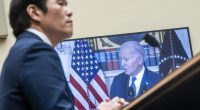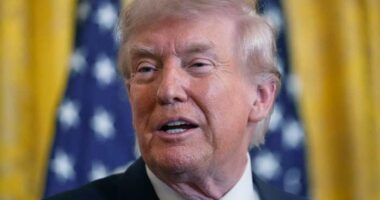Share this @internewscast.com

On Saturday, President Trump criticized Walmart for its decision to increase prices following the escalating costs linked to his administration’s trade conflicts.
“Walmart should refrain from using tariffs as an excuse to hike prices across their stores,” the president posted on Truth Social. “Last year, Walmart’s profits soared, exceeding expectations significantly.”
“Walmart and China need to absorb the tariffs’ costs themselves and should not pass them on to loyal customers,” he stated. “I’ll be observing closely, and so will your customers!!!”
On Thursday, the retail giant announced plans to increase prices as early as next month in an effort to pass along costs associated with Trump’s sweeping tariff agenda.
“The magnitude and speed at which these prices are coming to us is somewhat unprecedented in history,” Walmart Chief Financial Officer John David Rainey told The Wall Street Journal earlier this week.
The retail giant did not release a profit outlook for the first quarter of the year due to the uncertainty surrounding the economy as experts have warned for months about negative impacts on U.S. consumers.
“We will do our best to keep our prices as low as possible, but given the magnitude of the tariffs, even at the reduced levels announced this week, we aren’t able to absorb all the pressure given the reality of narrow retail margins,” Walmart CEO Doug McMillon said during a Thursday earning’s call.
The company on Thursday shared that its profits slipped in the first quarter of the year, to $4.45 billion or 56 cents per share, from $5.10 billion or 63 cents per share, The Associated Press reported.
Trump’s Saturday post comes after the administration reversed course earlier this week, lowering tariffs on Chinese imports from 145 percent to 30 percent for 90 days. China, in response, lowered retaliatory tariffs from 125 percent to 10 percent.
The move marks another major reversal on trade from the Trump administration, which has included specific Chinese tariff exemptions; 25 percent tariffs on Canada and Mexico, most of which reverted to pre-existing terms; and a 90-day pause on “reciprocal” tariffs against dozens of countries.










